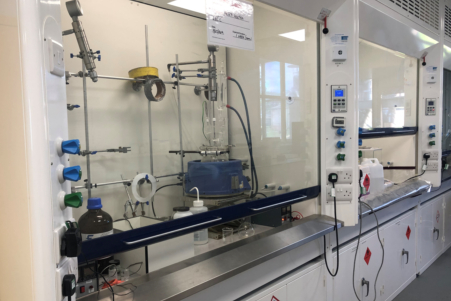Scott Bader joins CHAMPION project to research novel bio-based polymers
The bio-based polymers aim to replace conventional polymers in a variety of applications and promote alternative to end-of-life waste.

Source | Scott Bader
On July 28, Scott Bader Co. Ltd (Wellingborough, U.K.) announced that it is one of fourteen partners to have joined the Circular High-performance Aza-Michael Polymers as Innovative materials Originating from Nature (CHAMPION) project, a research and innovation project that aims to replace conventional polymers with novel bio-based polymers for coatings, textiles, homecare and structural adhesive applications.
Scott Bader says the project will run for three and a half years with the objective of improving the sustainability credentials of polymer-based products. So far, the project has been awarded Horizon 2020 Bio-based Industries Joint Undertaking (BBI JU) funding and includes fourteen partners from six European countries coordinated by the University of York (York, U.K.).
"The current approaches to polymer production are not compatible with the EU’s circular economy and green ambitions; the CHAMPION project will develop suitable, even superior replacements,” notes Professor James Clark, CHAMPION project coordinator.
According to Scott Bader, novel CHAMPION bio-based polymers obtained via the aza-Michael addition reaction (a simple, accessible addition reaction performed at moderate temperature, possibly without a catalyst and without releasing by-products) will be evaluated as sustainable replacements for polymers used in furniture coatings, home and personal care products, car interior surfaces and structural adhesives. The company says recovery, reuse and recycling (with the option of controlled energy recovery) are the end-of-life (EoL) options planned for the design of products using CHAMPION polymers. All products will be evaluated for sustainability via Life Cycle Assessment (LCA) and Techno-Economic Analysis (TEA).
“The composites industry is an enabler of a sustainable society however we must end the reliance on fossil derived chemicals while promoting alternatives to end-of-life waste. This multi-partner EU funded project will show us that we don’t have to compromise on performance to achieve a balance with nature,” says Dr. Steven Brown, technology development manager at Scott Bader, and chair of CompositesUK Sustainability Group.
Scott Bader says the CHAMPION project is another sign of its continued commitment to invest in new technology platforms following the recent creation of Polymer Mimetics, a joint venture with the University of Liverpool (Liverpool, U.K.).
Related Content
-
DITF develops water-spun lignin fibers as PAN precursor alternative
Lignin fibers produced via an aqueous solution and dry spinning process result in homogeneous, smooth-surfaced fibers that are more environmentally friendly and cost-saving.
-
Airbus works to improve the life cycle of composites in future aircraft
This companion article to CW's September 2024 Airbus Illescas plant tour discusses recycling, LCA, biocomposites, Fast Track technologies, qualification and more.
-
Duplicor biocomposite cladding aids redevelopment of ABN AMRO office building in Amsterdam
Chosen for low CO2 footprint, RC value >9, fire resistance, light weight and high strength, Duplicor façade structures are key to two-story extension.
















